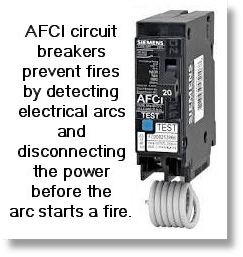Arc Fault Circuit Interrupters: Preventing Electrical Fires
Electrical fires are no small matter. In 2011, the Nation Fire Protection Association reported that an estimated total of 47,700 fires occurred due to electrical causes. Surprising? You’ll be even more surprised to learn that the Consumer Product Safety Commission found that a whopping 50 percent (or more) of these electrical fires could have been entirely prevented. How could these terrible incidents have been avoided? The CPSC has a very clear answer- the use of arc fault circuit interrupters (AFCI’s).
What are Arc Fault Circuit Interrupters?

Before we can address exactly what arc fault circuit interrupters are, we need to talk about what exactly they prevent- arc faults. An arc-fault occurs in the presence of damaged or overheating electrical wiring or electrical devices. When these corroded wires cross, they cause a spark, known in our case as an arc. The arc then causes a transfer of extreme heat within the outlet. An arc is identified by a buzzing sound coming directly from the outlet or switch. While this buzzing sound doesn’t necessarily mean imminent danger, you now have a huge risk factor to resolve. You can probably guess what this risk can cause- an electrical fire.
This is where arc fault circuit interrupters become incredibly valuable. The purpose of an AFCI is to detect when an arc fault occurs and to break the circuit as a result. The components within an arc fault circuit interrupter are able to detect an electrical current that measures outside of the normal ranges. Characteristics of an electrical current that an AFCI would be triggered by, typically around 100 kHz. When the AFCI is triggered, the circuit trips and the electrical fire is all but prevented.
We recently published a post on the importance of ground fault circuit interrupters (GFCI’S). GFCI’s are designed to prevent ground faults which are characterized by an electrical current coming into direct contact with a ground. ground faults offer extreme risks for electrocution and, in turn, are the reason that GFCI’s offer an incredibly important layer of protection.
Can’t a AFCI Take the Place of a GFCI or Vise-Versa?
Absolutely not. When it comes to AFCI’s and GFCI’s, a very important distinction needs to be made. AFCI’s and GFCI’s offer extensive protection of risks within your home but detect very different risks. As we’ve discussed, an arc fault circuit interrupter is designed to prevent electrical fires. GFCI’s are designed to prevent electrical shock. Due to this difference in design, one cannot be counted on to be implemented interchangeably.
To offer your home the utmost in protection from electrical related damages, you must include both an AFCI and a GFCI. Do both circuit interrupters perform amazing functions? Yes. Can one be substituted for another and expected to prevent the same damages? No. Make sure the safety of you, your family, and your home aren’t left to chance.
Electrical Fire Prevention Saves Lives
When you hear the statistics offered by the NFPA and the CPSC that we introduced at the beginning of this article, you’re likely to be concerned and rightfully so. Electrical fires are dangerous and often, unfortunately, result in a tragic loss of life. Make sure you’re informed and prepared to face any risk!
If you need more information on AFCI’s, GFCI’s, or any other topic within the realm of electrical services, don’t hesitate to give us a call! Right Electrical Services is here to make sure all of your electrical needs are satisfied.








